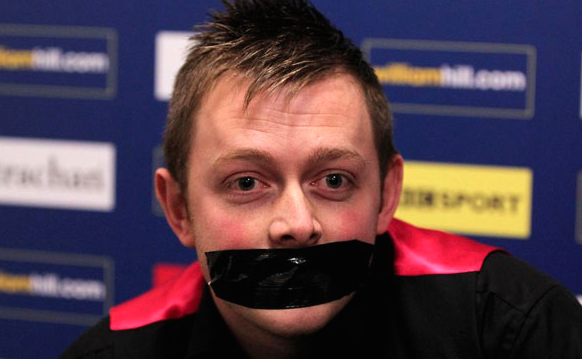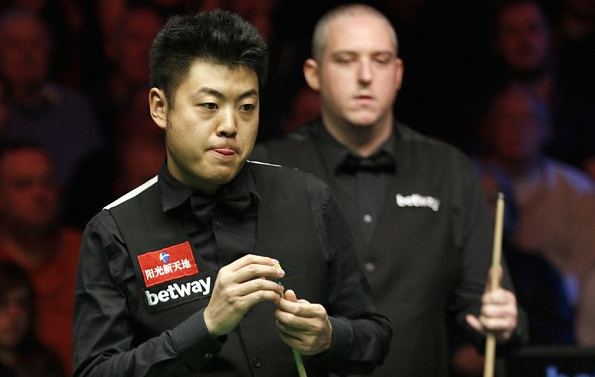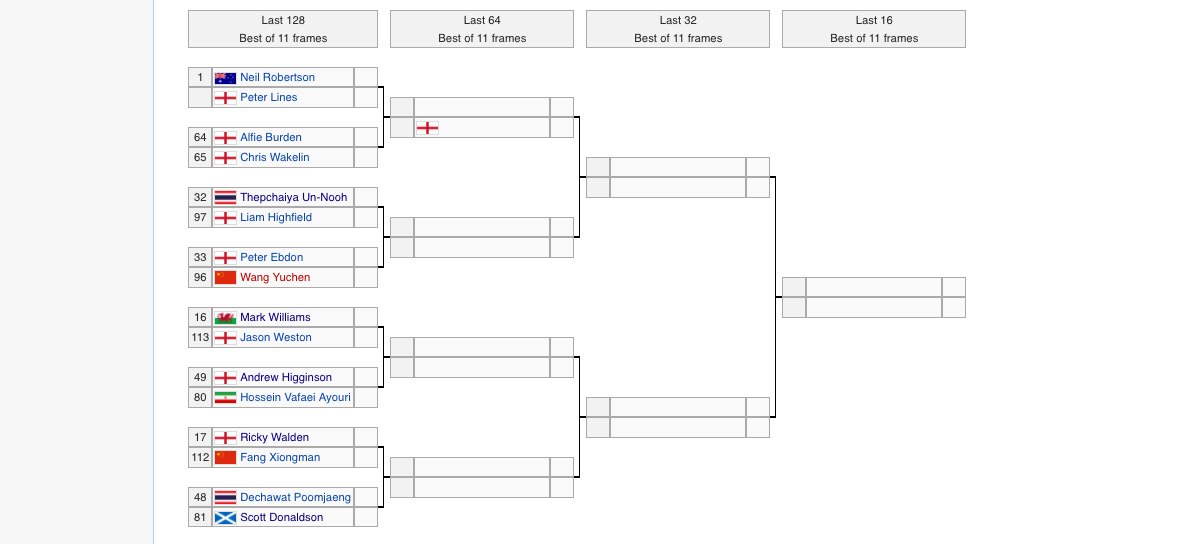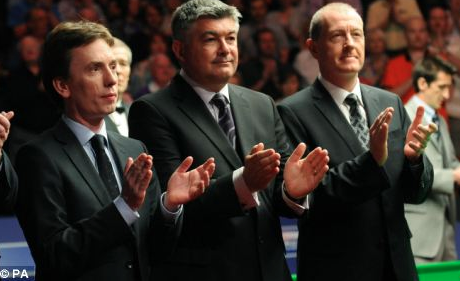“Remember qualifying rounds? Remember how they were present in almost every tournament so that the best of the best can automatically compete in all events and play longer matches because let’s be honest, more people would want to see Ronnie O’Sullivan than an absolute nobody, wouldn’t they? You get there by merit, rankings, and past achievements surely….? The UK Championship starts from the Last 32, no-one gives a jot about the previous rounds! This event is too important to follow this linear format…”
“But hang on mate, we are attracting a new audience! Snooker needs to be respected as a sport by proving that it is a BRUTAL sport! Look at just the first eighth of the UK draw! You do not win by taking shortcuts, you earn it in the fair, BRUTAL way by playing from the very start so that everyone has an equal chance of winning BIG! And it must be the same for the UK Championship to keep it fair and brutal since the top players had it easy! And it must be in shorter matches since the fanbase’s attention spans are clearly getting shorter and shorter….”
We have heard this dreary argument more times than an X-Factor contestant giving a compelling sob story, but this is a controversial topic. Since 2011, Barry Hearn made changes to one of the most prestigious competitions, where first he shortened the length of early-round matches from best-of-17 to best-of-11 (much to the fury of Mark Allen) and since 2013, the competition removed the qualification element altogether, with every player starting from Round 1 in a flat last-128 draw. I mean, we can understand why other tournaments followed suit, but “No,” I hear old gents cry, “not the UK Championship…”

But has it made the competition better? Has it given us the shocks and surprises it promised us or do we feel that this Triple Crown event had become ‘tainted’ somehow?
First off, from the players perspective. Top16 players wondered whether their hard-earned rankings had enough significance there at all. During their opening matches in 2013, Ali Carter was one of the biggest critics: “It’s hard to believe that if you are in the top 16 you would be in favour of this…we all started off at the bottom and got to the top so I don’t see why doesn’t everyone else have to do that” and in the same year, Judd Trump felt “there used to be a lot of excitement and it seems a bit ruined…It feels like a circus, there is so much going on out there.”[1] So the playing conditions for a lot of players are cramped, unappealing and noisy. Mainstream fans are less likely to care about what happens in the opening two matches until the Last 32, where you can argue the event really comes alive. Ronnie O’Sullivan likened the venue at the Welsh Open in Cardiff to a ‘shopping mall,’ but you need big venues to house 128 players. Having four matches play at the same time kind of loses the UK Championship’s past magic. He reiterated his point in an interview after beating Mark Allen in the Champion of Champions, saying it is just nice playing 16 of the best players in the world, compared to half of the tour he doesn’t know who “don’t even look like snooker players.”[3]
Then there is the change to the length of matches. I love the variety of snooker in terms of formatting, the best-of-11 in the International Championships, the best-of-19+ in the World Championships and the best-of-7s in Riga, Gibraltar, and European Championships. But I never really understood why only three tournaments get qualifying rounds (including the now-defunct Australian Goldfields Open) and why best-of-17 matches vanished in a puff of smoke. To be a brilliant, solid snooker player I believe, you should be good at shorter and longer games. Hell, sometimes I enjoy the World Championship Qualifying rounds a lot more than some other earlier competitions. It just seems fairly elitist that you can only play at least best-of-17 matches if you get to particular semis, finals and WC qualifying, and yet lower-ranked players are getting dropped because they keep losing best-of-7s and not given the chance to test they own endurance, which is one of the sport’s biggest tests, after all.

I can’t think of an appropriate picture, so here is a kitten wearing a sombrero. You are welcome.
On the other hand, you cannot argue whoever got to the latter stages of the UK deserved to get there. The prime example of this was David Grace last season, whose amazing run to the semi-finals beating Milkins, Ebdon and Gould saved his snooker career, as he was then ranked 80 in the world and almost certainly looking to drop out of the tour. The same could go to then-unknown Anthony McGill reaching the quarter-finals in 2014, little boy James Cahill beating Ding Junhui in the deciding frame, amateur Mitchell Travis victorious against Marco Fu, Liang Wenbo reaching his first Triple Crown final…there are more interesting moments most skeptics care to admit. It is highly unlikely that they would achieve all this if qualifications were an obstacle. This was the kind of hysteria Bazza was hoping for in the UK Championship and in some ways, the tournament is more exciting; either that or the two giants of the game coming through gruelling matches for the highly-anticipated final in Trump vs. O’Sullivan in 2014 – that to me makes the final and winning the title more important, more of a spectacle, that you earned it.

Everyone loves an underdog story, and what better to do it at one of the biggest stages – the UK Championship? It gives lower-ranked players to upset the titans and forcing the elite to up their game, come out of their shell and lofty position and almost prove their ranking by defeating everyone on the circuit rather than someone who happened to go through the qualifying stages. Doherty reiterated that the Top16 had too much protection, including when he was there and therefore, this is a fairer system.[1] There is a huge emphasis on consistency here and that is why Selby, Bingham, and Trump are at the top while Walden, Milkins and Maguire are falling down the rankings. We saw that “despite no longer being seeded through to the venue stages of events, still the best players in the world are more often than not able to progress and make it through to the venues on merit,” so it does make you wonder if there is a point at all. [4] Maybe change here in particular if necessary to attract a younger audience, to throw out the idea that snooker is long, drawn-out and boring or snooker would cease to exist. One reporter claimed:
“They are becoming faster, brighter, easier for the casual punter to follow, even if it means sacrificing something of the soul of the game. You see it in cricket, you see it in rugby — where the legislators are doing everything possible to eliminate the messy, muddy business of rucks and mauls — so why should snooker be any different?”[2]
It is true. Snooker needs to evolve and Barry is doing a fantastic job of doing that. Bringing in flat draws are a great idea and I do not oppose it at all. However, I do oppose it in the UK Championship. Yes, the flat draws brought out stories in the UK Championship that wouldn’t have happened under the previous format. Yes, it gives opportunities to lower-ranked players to prove themselves in front of the BBC. But, because of the new format – I do think the tournament is less prestigious than before. It’s been watered down by the lack of audiences watching the first two rounds of matches. Rankings are not as significant as before and I feel the Top16 deserve automatic qualification here, especially for a Triple Crown event where it should feature the best of the best and they are the ones people want to watch. It draws more crowds in, there are fewer tables in the area to make it more of an occasion and that makes the UK Championship more special. Players don’t get rewarded for their ranking often by qualification or playing fewer qualification matches. Lastly, the best-of-17 is likely to have more tosses and turns and tend to test their resilience, the recent, exciting Northern Ireland Open final between Mark King and Barry Hawkins is a prime example! So, please bring back best-of-17s – please?

- [1] Mail Online., “Trump and Carter blast atmosphere at UK Championship despite easing into second round.” (29th November 2013) Available from: dailymail.co.uk/…/Judd-Trump-Ali-Carter-blast-UK-Championship-atmosphere
- [2] Briggs, S., “Barry Hearn still the master of PR as he turns tables on critics of snooker’s brave new world.” The Daily Telegraph. (9th December 2011). Available from: telegraph.co.uk/…/Barry-Hearn-still-the-master-of-PR-as-he-turns-tables-on-critics-of-snookers-brave-new-world
- [3] Snooker 4All., “Ronnie O’Sullivan after SF Champion of Champions 2016.” Youtube. (11th November 2016). Available from: youtube.com/watch
- [4] Huart, M., “Flat Draws and Top Seeds – The Story So Far.” WPBSA. (4th October 2015). Available from: wpbsa.com/flat-draws-and-top-seeds-the-story-so-far





1 thought on “FEATURED: Is the UK Championship better with the current linear format?”
Comments are closed.